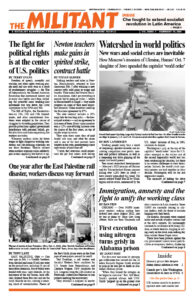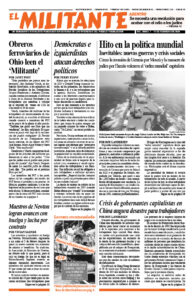MONTREAL — The deadly Oct. 7 Hamas pogrom targeting Jews in Israel highlighted the danger of Jew-hating violence worldwide as the crisis of capitalism grows. And it shows why the existence of Israel as a refuge for Jews is essential.
Israel was made inevitable by three key historical facts: the betrayal by counterrevolutionary Stalinist parties of the ripe prospects for workers to take political power in Europe in the 1930s; the refusal by the imperialist rulers in Washington, London, Ottawa and elsewhere to open their borders to Jews seeking to flee Nazi persecution before, during and after World War II; and the horror of the Holocaust — the slaughter of 6 million Jews, 40% of the Jewish population of the world.
The Stalinized Communist Party in Germany refused to forge an alliance with the Social Democratic Party to fight to stop Adolf Hitler, claiming the Nazis wouldn’t be able to hold onto power and the Communist Party would take power next. Hitler was named chancellor Jan. 30, 1933, and this led to the crushing of the German workers and their unions. His murderous fascist party took the country into the second imperialist world slaughter.
Central to the Nazis’ program was blaming the Jews for the deep economic and social crisis wracking Germany and their concerted campaign to wipe all the Jews off the face of the earth.
In face of the fascist terror, Jews attempted to flee Germany and Europe as a whole. But from 1933 to 1945 only 5,000 Jews were admitted to Canada, the lowest figure for any imperialist country in the world, all of which moved to close their borders. This was led by Frederick Blair, the director of immigration for the Canadian government, an outspoken antisemite.
‘None is too many’
When asked how many Jews the Canadian government would admit, one prominent official replied, “None is too many,” a quote that became famous when a book by that name was published in 1982 by Irving Abella and Harold Troper. The authors unearthed thousands of letters written by European Jews seeking refuge who were rebuffed by the government in Ottawa.
Trade unions and Jewish organizations in Canada pressed the government to open the doors to large numbers of Jewish refugees as well as others. On July 11, 1933, there was a two-hour strike and rally of 25,000 workers in Toronto protesting antisemitic violence by the Nazis in Germany. It was led by the International Ladies’ Garment Workers Union and the Amalgamated Clothing and Textile Workers Union, both of which had heavily Jewish memberships. The action was backed by working-class political organizations, including the Communist Party and the International Left Opposition, a predecessor of the Communist League in Canada today.
On Nov. 8 and 9, 1938, the Germany-wide Nazi-led pogrom against Jews known as the Kristallnacht took place. Fascist thugs destroyed at least 267 synagogues and 7,000 Jewish businesses, vandalized cemeteries and schools, destroyed an untold number of homes and murdered at least 91 Jews and raped hundreds of women. Thirty thousand Jews were rounded up and sent to concentration camps.
Canadian unions demand action
Eleven days later there were rallies across the country organized by the Canadian Jewish Congress demanding the admission of Jewish refugees. Twenty thousand people rallied in Toronto, 4,000 in Winnipeg, 600 in Quebec City and many more in other towns across Canada. On Nov. 23 a group of Jewish leaders met with Prime Minister William Lyon McKenzie King and then immigration minister Thomas Crerar demanding that Ottawa admit 10,000 Jewish refugees. Earlier that year, King had written he intended to keep Canada “free from unrest and from too great an intermixture of foreign strains of blood.”
The government refused to budge. On June 7, 1939, the trans-Atlantic liner St. Louis, carrying 900 passengers, was turned away from Canada after it had tried unsuccessfully to dock in Cuba and the United States. Almost all the passengers were Jewish. The ship’s crew had no alternative but to return to Europe, where 253 of the passengers were to perish in the Holocaust.
With the defeat of Germany and the end of the war, a quarter million Jews who had survived Nazi concentration camps were held in “displaced person camps” set up in Germany, Austria and Italy by the victorious Allied governments. Many were former concentration camps or German army barracks. Those quarantined there desperately sought to find refuge abroad, to little avail.
Workers rose up in revolutionary struggles across Europe after the war, in Greece, France and Italy. Victories would have transformed the situation for the Jews, but these opportunities were betrayed by the Stalinists in each country, backed by Joseph Stalin in the Soviet Union.
Canada’s borders remained largely shut to Jews. Between 1945 and 1948 Jews were only 8,000 out of 65,000 refugees admitted to the country.
With all other avenues for refuge cut off, Jews in the displaced person camps attempted to make it to Palestine. The best-known example was the ship Exodus, with some 4,500 Jews on board, which made it to Haifa harbor. But the British colonial rulers brutally attacked the boat, killing three and wounding many others, forcing the crew to return its passengers to France.
Some 52,000 Jews trying to reach Palestine were held by the British military in detention camps behind barbwire on Cyprus. Given all these conditions, Jews in Palestine fought to create the state of Israel. In 1948 Israel was recognized by the United Nations and Britain. In total some 700,000 Jewish refugees found a way to get there despite all the attempts to block them.
How Canada’s capitalist rulers closed their borders to the Jews confirms what Abram Leon said in The Jewish Question: A Marxist Interpretation: “There is no solution to the Jewish question under capitalism just as there is no solution to other problems posed before humanity, without profound social upheavals.”
What is needed is socialist revolution, in Canada and worldwide. And for that, workers need to build communist parties to lead the fight to overthrow capitalism and take political power.

